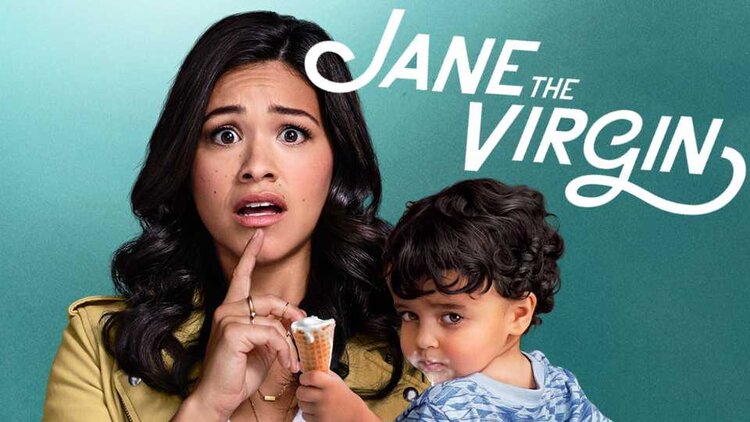Jane The Virgin: Diverse Voices & The Importance of Representation
La Virgen Jane: Voces Diversas & La Importancia de la Representación
The CW
Jane the Virgin was an American drama series loosely based on a Venezuelan telenovela, Juana la Virgen. On the surface, it is about a young Latina whose life is turned upside down when she is, accidentally, artificially inseminated. The true heart of the show is centered on the bond shared between her and her mother, Xiomara, and grandmother, Alba.
Showrunner, Jennie Snyder Urman, whose previous work includes Gilmore Girls, 90210, Hope & Faith, knew how to write strong family storylines with compelling characters. In order to properly convey diverse and inclusive topics, she would need a team of writers that represented the characters as well. According to an interview with New York Magazine, the staff of writers was comprised of ten women and three men. The staff writers included Carolina Rivera, Valentina Garza, and Rafael Agustín. Garza and Rivera have past experience in telenovelas and Telemundo. Agustín’s own immigration story inspired one of the series’ strongest storylines, which follows Jane’s grandmother, Alba, in her journey to getting her green card and becoming a US citizen. These dynamic and multifaceted characters would not have been properly created without writers who can relate their own struggles.
Jane’s father, Rogelio, portrayed by Jaime Camil, stars as a wildly famous telenovela star looking to make his big break in Hollywood. As the series progresses, he fights to bring Hispanic stories to a new audience. An example of life imitating art, Jane the Virgin mirrors that journey by bringing diverse storylines to a mainstream American network. Jane the Virgin used its strengths in magical realism and drama to bring a Latinx family to mainstream American audiences. Jane the Virgin also wasn't afraid to tackle pivotal storylines. The characters dealt with sexuality, mental health, immigration, single motherhood, grief, cancer while still keeping true to its telenovela roots. Jane the Virgin gave a multicultural generation a warm and familiar atmosphere of homeliness and family.
As Jane’s chapters came to a close —weeks ago—, I thanked her. I thanked Jane for all the laughs, tears, and emotional experiences we shared. Alba, for reminding me how much I love my own grandmother and the importance of family history. Xiomara, for showing me the many roles mothers wear. Most of all, I’m thankful for living in a time where stories like my own could be shared on a successful TV show. Surely, its mere presence inspired many to bring even more Latinx stories onto television, I know it did for me.
The CW
Jane the Virgin fue una serie dramática estadounidense basada libremente en una telenovela venezolana, Juana la Virgen. En la superficie, se trata de una joven latina cuya vida se pone patas arriba cuando, accidentalmente, es inseminada artificialmente. El verdadero corazón del espectáculo se centra en el vínculo compartido entre ella y su madre, Xiomara, y su abuela, Alba.
Showrunner, Jennie Snyder Urman, cuyos trabajos anteriores incluyen Gilmore Girls, 90210, Hope & Faith, sabía cómo escribir historias familiares con personajes irresistibles para lxs expectadxs. Para transmitir adecuadamente temas diversos e inclusivos, se necesitaba un equipo de escritorxs que representaran a lxs personajes adecuadamente. Según una entrevista con la revista New York Magazine, el equipo de escritorxs estaba compuesto por diez mujeres y tres hombres, incluyendo a Carolina Rivera, Valentina Garza y Rafael Agustín. Garza y Rivera tienen experiencia previa en telenovelas y Telemundo. La propia historia de inmigración de Agustín inspiró a una de las historias más fuertes de la serie, que sigue a la abuela de Jane, Alba, en su viaje para obtener su green card y luego convertirse en ciudadana estadounidense. Estos personajes dinámicos y multifacéticos no se habrían creado correctamente sin escritorxs que puedan relatar sus propias luchas y contexto.
El padre de Jane, Rogelio, interpretado por Jaime Camil, interpreta a una estrella de telenovela famosa que busca el éxito en Hollywood. A medida que avanza la serie, él lucha para llevar las historias hispanas a una nueva audiencia. En un ejemplo de cómo la vida imita el arte, Jane the Virgin, hace lo mismo al traer historias diversas a un público estadounidense convencional.
Jane the Virgin también usó sus fortalezas en el realismo mágico y el drama para llevar una familia latinx al público estadounidense a una escala mucho más grande de lo que muchos programas latinxs han podido lograr. El show tampoco tenía miedo de abordar temas importantes. Los personajes llegaron a hablar de la sexualidad, la salud mental, la inmigración, la maternidad soltera, el duelo y el cáncer, sin dejar de ser fieles a sus raíces de telenovelas. Jane the Virgin le dio a una generación multicultural un ambiente cálido y familiar de hogar y familia.
Cuando los capítulos de Jane llegaron a su fin —semanas atrás—, me sentí agradecida. Le agradecí a Jane por todas las risas, lágrimas y experiencias emocionales que compartimos. A Alba, por recordarme cuánto amo a mi propia abuela y la importancia de la historias familiares. Xiomara, por mostrarme los muchos roles que llevan las madres. Sobre todo, estoy agradecida por vivir en una época en la que historias como la mía podrían compartirse en un programa de televisión exitoso. Seguramente, su mera presencia inspiró a muchxs a traer aún más historias de latinxs a la televisión. A mí sí que me inspiró.
Marjorie is a journalism student in New York. She loves writing about climate change, social issues, and pop culture. She enjoys reading the New York Times, watching the sun set and too many baking shows. / Marjorie es una estudiante de periodismo en Nueva York. Le encanta escribir sobre cambio climático, problemas sociales y pop culture. A Marjorie le gusta leer el New York Times, ver atardeceres y demasiados shows de repostería.


